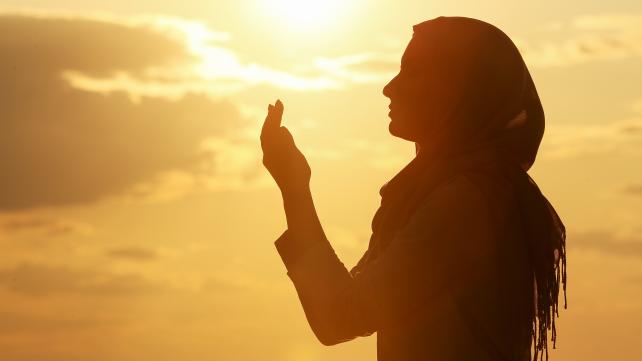
Three Levels of Shukr in Islam
By Mahasin D. Shamsid-Deen
In Islam the concept of being thankful or grateful is deeply rooted in the Holy Qur’an and the life example and traditions of Muhammad, the Prophet(pbuh). We are asked to be thankful and keep making dua to thank Allah . In the first chapter of the Qur’an, we say and believe “Alhumdulillah, Rabi al – Ameen” – All Praise belongs to Allah, The Lord of all the Worlds. In our daily salaah, we repeat the phrase “Alhumdulillah” at least 17 times a day.
As Muslims, even when we greet each other with ‘As Salaam Alaikum”, this is generally followed with the polite inquiry “How are you?”. The most common response in the worldwide community of Muslims is “Alhumdulillah!” – All the Praise belongs to Allah.
This praise and gratitude that we have for Allah, The Most High, is a daily and integral part of our lives. It is not something to take for granted. Scholars in Islamic adab and iman have explained the concept of thankfulness and gratitude in Islam on three levels:
- Shukr bi'l-qalb - gratitude expressed by our inner feeling of what is in our heart
- Shukr bi'l-lisan - gratitude expressed by tongue and what we say
- Shukr bi'l-badan wa'l-arkan - gratitude expressed by body and limbs in our good deeds and actions
Shukr bi’l qalb
At a very basic level of Iman, belief in Allah is a form of shukr. This gratefulness of the heart is a deliberate consciousness of belief tied with a thankfulness in our very soul for what Allah has given us as human beings. We internalize the ultimate goal of being sincere in our submission to Him. Allah, instructs us in the book of certainty for those who are God-Conscious – the Qur’an, that being thankful to Him deep in our hearts is part of our true devotion to Him.
Allah instructs us in the Qur’an to be grateful for being given intelligence
“It is He Who brought you forth from the wombs of your mothers when you knew nothing; and He gave you hearing and sight and intelligence and affection: that you may give thanks (to Allah).” (Surah an-Naḥl, 16:78)
Allah has told us in the Qur’an how His pleasure may be attained through gratitude:
“And if you are grateful, He is pleased with it for you…”
(Az-Zumar 39:7)
Allah has assured us in the Qur’an, that our gratitude brings Him close to us
“Then remember Me; I will remember you. Be grateful to Me, and do not reject Me.”
(Surah al-Baqarah 2:152)
Allah has even instructed us in Al-Qur’an how our gratefulness is rewarded
“And [remember] when your Lord proclaimed, “If you are grateful, I will surely increase you [in blessings]; but if you deny, indeed, My punishment is severe. ” (Surah Ibrahim 14:7)
These and many other Qur’anic verses demonstrate the magnificence of being grateful in our hearts.
Shukr bi'l-lisan
The many favors that Allah has bestowed on the human being are to be glorified not just in our hearts, but also in our words. Words of gratitude should always be in our language and emit from our tongue. We speak of our gratitude to that which Allah has provided us. But this should never be a pat response or something that we take for granted. Taking the bounty of Allah for granted is a form of ungratefulness and kufr. So, for instance when someone greets us and inquires how we are, the “Alhumdulillah” that we say should be sincere and with thoughtful purpose. The believing Muslim will say “Alhumdulillah” regardless of our health status, because we know that “Alhumdulillah Allah has allowed me to be alive”; “Alhumdulillah, Allah has given me faculties and speech, hearing, movement and thought,” and “Alhumdulillah, Allah has even granted me leave to be in the presence of the asker so that we may glorify Allah together.”
It is wise us to speak words of gratitude often and with sincerity. The best words are our du’a -
“My Lord, enable me to be grateful for Your favor which You have bestowed upon me and upon my parents and to do righteousness of which You approve. And admit me by Your mercy into [the ranks of] Your righteous servants.” (Qur’an 27:19)
As we practice saying words of gratefulness often, the rewards for this expression of faith are enormous.
Shukr bi'l-badan wa'l-arkan
The essential elements of Islam require action on the part of the believer. We believe in Allah in our hearts, but we also say the shahdah aloud for others to hear. We have the actual action of praying, fasting, giving charity and even physically going to hajj. Thus, our gratefulness is also a part of our worship demonstrated by our deeds.
The concept of being grateful in our actions and deeds is in the Holy Qur’an, where Allah, The Most High, instructs us to work in gratitude – to be active, build, design and do these things with a thankfulness.
“Work, O family of Dāwūd, in gratitude.” (Saba’ 34:13)
Allah assures us in the Qur’an that our good deeds and efforts are rewarded
“Indeed, this for you is a reward, and your effort has been appreciated .” (Al-Insān 76:22)
As we reflect upon the words in the Qur’an, the Bounty of Allah, is endless and we should be ever grateful to Him.
“And He gave you from all you asked of Him. And if you should count the favors of Allah, you could not enumerate them. Indeed, mankind is [generally] most unjust and ungrateful .” (Ibrahim 14:34)
https://www.soundvision.com/article/3-levels-of-shukr-in-islam?eType=EmailBlastContent&eId=0f6fd7e0-5d57-4092-a8c8-456e3576d9e4&eType=EmailBlastContent&eId=be77cb27-b94d-43b6-a87a-bb3b264f9457

